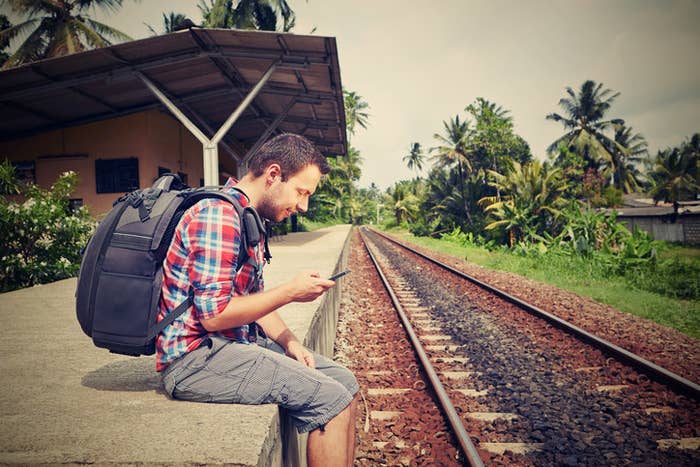
Traveling outside the country without paying for cellular data is possible, but it’s annoying. The harder it is to find a decent Wi-Fi signal, or the more expensive SIM cards and data plans are in the place you’re visiting, the more annoying it can be. But Airbnb might be working on a solution.
According to a patent application published this week, the company’s “design studio” is working on concept for a device that will help travelers with limited or no access to Wi-Fi or cell networks by downloading lightweight, essential information about their trips, like maps and messages.
“When traveling in an area in which network connection is unavailable or unreliable or in which network connection is prohibitively expensive or inconvenient, the system … allows a client device ... to connect to external web services without a direct network connection,” the filing says.
One of the Airbnb employees named on the patent application, Alex Blackstock, published a photo on LinkedIn that looks a lot like the drawings in the patent filing, CBInsights pointed out in a blog post yesterday.
Obviously, a patent filing does not a “Beam Device Architecture” make; there’s no way of knowing if Airbnb will ever actually produce the product. Though the startup is worth $31 billion, that valuation is more the product of its massive network of users than its history of cutting edge technological innovation.
If Airbnb actually starts developing the beam modem, it would be one of the company’s first forays into hardware, though it is also working on things like keyless access and other connected home features through partnerships with companies like Vivint. And Airbnb CEO Brian Chesky discussed other reach technologies — like bitcoin, artificially intelligent travel assistants, and smart TVs — the company might be interested in pursuing in a Twitter thread last December. At the time, Chesky tweeted that “a lot of people” requested a system for guaranteeing more reliable Wi-Fi. This device could be an answer to that.
Reached for comment, a spokesperson said it was too early to discuss Airbnb’s intentions regarding the patent.
But if, someday, Airbnb does manage to build a device that could, say, help you find the location of important landmarks, restaurants, or even your Airbnb itself when you have no service and no idea where you are, that would be pretty tight.
According to the patent filing, Airbnb’s beam device would involve three parts — a “client device” such as an iPhone or a computer, the beam modem (pictured above), and a beam API server. The patent describes how those three things would work in concert to provide a wayward traveler with compressed and “minified” data about their trip:
“Before a trip, when the user has a good connection to the Internet, the beam API server ... receives information about where the user will be traveling and communicates with the client device ... to store map data for the travel location on the client device ... Then, when the user is traveling in the specified location and sends a web request for location data, the beam API server ... only has to transmit data that has not already been pre-cached such as the location of a restaurant or point of interest, but does not have to transmit map data to enable navigation on the client device.”
Being able to plan a travel and sightseeing itinerary that is accessible no matter where you are or how crappy your cell service could be incredibly useful. The filing also suggests that, before embarking on a trip, users could pre-select what kind of Airbnb information — ”such as maps and messaging” — they want to easily access when they’re traveling.
In the filing, Airbnb also signals where it imagines people using its beam modem most often: places like Cuba, most of Africa, and China — which all have either limited or censored cell networks, and little in the way of Wi-Fi. (I’d add that there are plenty of places in rural California that are lacking cell service, too.) The problem with this, Airbnb says, is that many modern travelers “consider connection to certain electronic services as essential,” especially “when traveling away from home in an unfamiliar place.” As Airbnb pushes for growth in foreign markets, especially China, the ability to provide guests with reliable internet access could be a major draw for people unaccustomed to navigating without the ‘net.
CORRECTION
This story has been updated to reflect that this patent is in the application process.
